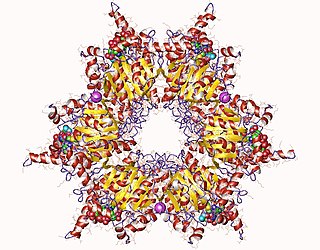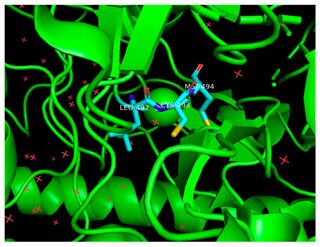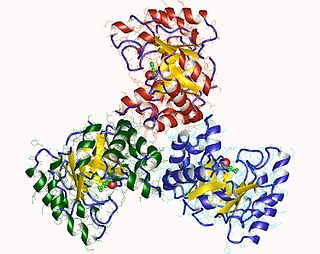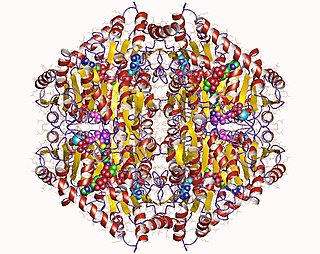Carboxy-lyases, also known as decarboxylases, are carbon–carbon lyases that add or remove a carboxyl group from organic compounds. These enzymes catalyze the decarboxylation of amino acids, beta-keto acids and alpha-keto acids.

Oxaloacetate decarboxylase is a carboxy-lyase involved in the conversion of oxaloacetate into pyruvate.

In enzymology, a methylmalonyl-CoA carboxytransferase is an enzyme that catalyzes the chemical reaction
In enzymology, a citramalate CoA-transferase is an enzyme that catalyzes the chemical reaction
The enzyme 4-carboxymuconolactone decarboxylase (EC 4.1.1.44) catalyzes the chemical reaction
The enzyme 5-oxopent-3-ene-1,2,5-tricarboxylate decarboxylase (EC 4.1.1.68) catalyzes the chemical reaction
THe enzyme 6-methylsalicylate decarboxylase (EC 4.1.1.52) catalyzes the chemical reaction

In enzymology, an aspartate 4-decarboxylase (EC 4.1.1.12) is an enzyme that catalyzes the chemical reaction

The enzyme benzylsuccinate synthase catalyzes the chemical reaction
The enzyme citramalate lyase catalyzes the chemical reaction
The enzyme citramalyl-CoA lyase catalyzes the chemical reaction

The enzyme citrate (pro-3S)-lyase catalyzes the chemical reaction
The enzyme citryl-CoA lyase catalyzes the chemical reaction
In enzymology, a glutaconyl-CoA decarboxylase (EC 4.1.1.70) is an enzyme that catalyzes the chemical reaction

In enzymology, a methylmalonyl-CoA decarboxylase (EC 7.2.4.3) is an enzyme that catalyzes the chemical reaction

The enzyme oxalyl-CoA decarboxylase (OXC) (EC 4.1.1.8), primarily produced by the gastrointestinal bacterium Oxalobacter formigenes, catalyzes the chemical reaction
In enzymology, a [citrate (pro-3S)-lyase] ligase is an enzyme that catalyzes the chemical reaction
In enzymology, formate C-acetyltransferase is an enzyme. Pyruvate formate lyase is found in Escherichia coli and other organisms. It helps regulate anaerobic glucose metabolism. Using radical non-redox chemistry, it catalyzes the reversible conversion of pyruvate and coenzyme-A into formate and acetyl-CoA. The reaction occurs as follows:
Biotin-independent malonate decarboxylase (EC 4.1.1.88, malonate decarboxylase (without biotin), malonate decarboxylase, MDC) is an enzyme with systematic name malonate carboxy-lyase (biotin-independent). This enzyme catalyses the following chemical reaction
Indoleacetate decarboxylase (IAD) is a glycyl radical enzyme that catalyses the decarboxylation of indoleacetate to form skatole, which is a malodorous organic compound that gives animal faeces their characteristic smell. This decarboxylation is the last step of the tryptophan fermentation in some types of anaerobic bacteria.







